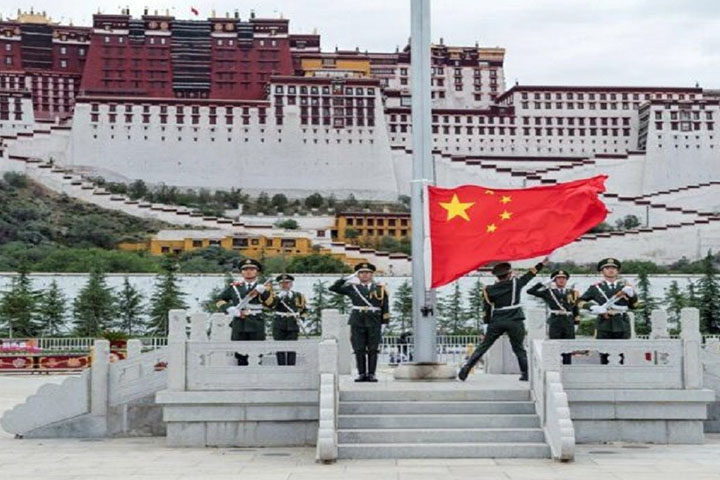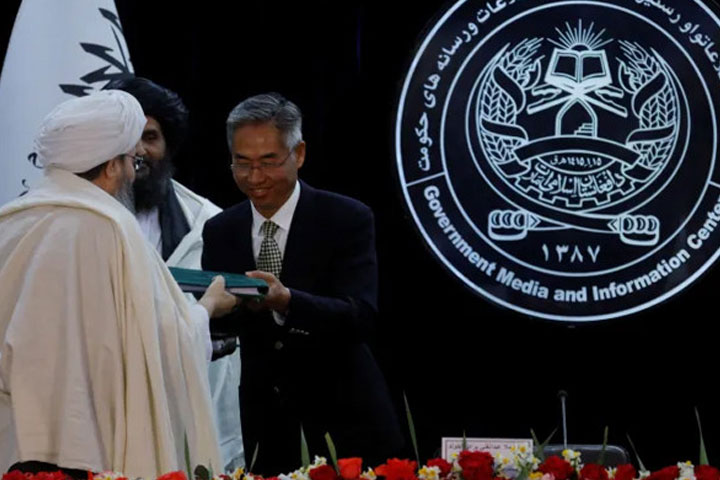Afghan Taliban in oil extraction deal with Chinese company
Most of the world has shied away from having any truck, notably barring provision of humanitarian assistance, with a Taliban regime that is increasingly beginning to resemble the hard-line medieval version that had disquieted the world at the turn of the last century.
At a time when even leading humanitarian non-governmental organizations (NGO) have stopped their essential and laudable work in Afghanistan after the Taliban banned women NGO employees and volunteers from working in the country, and at a juncture when the Taliban was barring Afghan women from all access to higher education, it would surely take a country with very little scruples to sign oil exploitation contracts with a Taliban regime that no other country in the world has recognized. China’s Xinjiang Central Asia Petroleum and Gas Company did exactly that last Thursday when it signed a contract with Afghanistan’s Taliban-led administration that gave the Chinese company the right to extract oil from the Amu Darya basin in northern Afghanistan for the next 25 years.
First things first – where is it that Afghanistan finds itself 16 months after it came under Taliban control? As The Asia Foundation described in its 11 January study titled ‘The Future Forecast: Asia in 2023’, possibly the only positive development in the country has been a relative improvement in the security situation as most of the violence reported before August 2021 was attributable to the Taliban insurgency. The Foundation went on to say that “Unfortunately, on all other fronts the hardships that Afghans must endure have continued to grow, with rapidly rising poverty and unemployment, a collapsing economy, and desperately inadequate public services. Yet, faced with these unprecedented challenges, the main highlights of the Taliban’s rule in 2022 have been draconian restrictions on women’s right to work, to go to school, or to participate in activities outside the home, even visits to public parks with their families”. It lamented that calls from the international community for the formation of an inclusive and consensus-based government with a mandate to clarify Afghanistan’s future political system and priorities had proved to be ineffective as these had rebounded off deaf Taliban ears, and it concluded that “As a result of these unilateral policies, Afghanistan’s current regime remains unrecognized by the international community. The Taliban’s insistence on maintaining their highly authoritarian and restrictive model of governance could push this overwhelmingly aid-dependent country into a humanitarian catastrophe and a possible return to civil unrest”.
Despite this less than satisfactory situation prevailing in Afghanistan, attempts by certain regional countries, prominent among them being China, to accord de-facto recognition to the Taliban regime through the back door have been ongoing for quite some time now. Several of Afghanistan’s neighbours, including China and Pakistan, have accepted Taliban-appointed diplomats. Beijing and Islamabad have even gone to the extent of formally accrediting Taliban-appointed diplomats, which, as Giorgio Cafiero pointed out in Al Jazeera, underscored how the Taliban’s international isolation was relative and fragile. That has also put other neighbouring countries, which have historical stakes in Afghanistan but have thus far not accepted Taliban-appointed representatives, in a predicament. India is one such example. It has been repeatedly requested by the Taliban to accept the posting of a Taliban-appointed Ambassador in New Delhi, but has not consented. India, over decades, has contributed significantly to Afghanistan’s development without getting involved in the fighting that has raged across the country through much of this period. It is now watching with some concern the growing Chinese influence in Afghanistan, and New Delhi too would be under some pressure to resume its own development projects in the region, even if just to push back against the growing Chinese influence.
Zhou Bo, a former senior Colonel in China’s People’s Liberation Army, wrote five days after the Taliban took control of Afghanistan last year that “Afghanistan has long been considered a graveyard for conquerors – Alexander the Great, the British Empire, the Soviet Union and now the United States. Now China enters – armed not with bombs but construction blueprints, and a chance to prove the curse can be broken”. Al Jazeera reported that Beijing has offered the Taliban economic and development support on the condition that Afghanistan cooperates with China vis-à-vis Uighur armed groups and avoids targeting Chinese interests, particularly the Belt and Road Initiative (BRI). It opined that China could help the Taliban circumvent Western sanctions, explaining that “Chinese companies investing in Afghanistan could decrease the harm caused by the West’s financial warfare, which in turn would benefit China in terms of its ability to access the war-torn country’s prized rare-earth mineral reserves, copper, lithium, iron ore, and other natural resources”. Also, “As China, Russia, and Iran grow increasingly cooperative in their efforts to challenge US hegemony, these powers might come around to viewing the Taliban as a partner through which they can expand their influence in Greater Central Asia”.
It is in this backdrop that news broke last week of the contract to extract oil from the Amu Darya basin that the Xinjiang Central Asia Petroleum and Gas Company had signed with Afghanistan’s Taliban-led administration. The contract was signed in Kabul by acting Taliban Minister of Mines and Petroleum Sheikh Shahabuddin Delawar and an official of the Xinjiang Central Asia Petroleum and Gas Company. Acting Taliban Deputy Prime Minister Mullah Abdul Ghani Baradar and Chinese Ambassador to Afghanistan Wang Yu also witnessed the signing ceremony, State-run Bakhtar News Agency reported. It was the first major public commodities extraction deal that the Taliban administration has signed with a foreign company since taking power.
As per the 25-year contract, the Chinese company will invest $150 million a year in Afghanistan and its investment will increase to $540 million in three years, even though the current security scenario does not assure it of attractive returns. The Taliban-run administration will have a 20% partnership in the project, which can be increased to 75%. In 2012, up to 87 million barrels of crude were estimated to be in the Amu Darya basin. Delawar informed that under the deal the Chinese company will be extracting oil from an area covering 4,500 square kilometers (1,737 square miles) collectively in Sar-e-Pul, Jawzjan, and Faryab provinces. He added that “Over 3,000 local people will get jobs in this project”, and that a condition of the deal was that the oil extracted would be processed in Afghanistan.
Deputy PM Baradar said on the occasion that “In terms of natural resources, Afghanistan is a wealthy nation. In addition to other minerals, oil is the wealth of the Afghan people on which the economy of the country can rely”. Afghanistan is estimated to be sitting on untapped mineral resources worth more than $1 trillion. Baradar added, “Recently, several projects were approved by the Economic Commission, and with their undertaking, fundamental steps will be taken for the prosperity of the country and public welfare”. Chinese Ambassador Wang Yu called the deal important for the economic growth of war-torn Afghanistan and a positive step towards close relations between Kabul and Beijing. He said, “The Amu Darya oil contract is an important project between China and Afghanistan”. Meanwhile, a Chinese State-owned company is also in talks with the Taliban-led administration over the operation of a copper mine in eastern Logar province, a $3 billion deal for which was first signed under the previous Afghan government but has since fallen by the wayside.
The pariah status of Taliban-administered Afghanistan in the eyes of most of the rest of the world has not prevented China from pursuing an active strategy aimed at working towards surreptitiously granting de-facto recognition to the Taliban. If accrediting diplomats and other similar actions were initial steps in this direction, the resumption of economic activity is what China would have really desired. That fits in perfectly with China’s consistent policy of preying on vulnerable and deeply distressed nations, mainly, but not exclusively, through entrapment in a vicious cycle of debt and steep repayment of debt via the BRI. Most other countries would view investments or projects in today’s Afghanistan as not being worth the risk in the existing unstable milieu, but not Beijing. It has long had covetous eyes on Afghanistan’s vast untapped resources, and the temptation of a West-free playing field is proving just too much for it to resist, the risks notwithstanding. If that means signing contracts with pariahs who were till recently called terrorists, thereby virtually granting them recognition, for the current Chinese regime that does not seem to pose any headaches.
Another notable aspect of the contract is that it has been concluded at a time when just like in neighbouring Pakistan, Chinese nationals are increasingly being targeted in terrorist attacks in Afghanistan. In fact, the announcement of the contract came just a day after the Taliban administration said that its forces had killed eight Islamic State Khorasan Province (ISKP) members in raids, including some who were behind an attack on a hotel catering to Chinese businessmen in Kabul last month. More recently, a suicide bombing in the heart of Kabul on the evening of 11 January targeted members of a Chinese delegation that was due to meet Taliban officials in the Afghan Foreign Ministry.
The suicide bomber detonated himself near the Ministry, causing at least 20 casualties. The ISKP claimed responsibility for the attack.
The ISKP’s involvement in these attacks against Chinese nationals in Afghanistan is interesting, as it has long been held that the ISKP in Afghanistan is a creation of the Pakistani intelligence agency, the Inter-Services Intelligence (ISI). A report of the Afghan Institute of Strategic Studies had noted that, “the presence of ISIS in Afghanistan is not genuine. It is an intelligence game played by some of our neighbors”. Pakistan, the report added, supported the ISKP as part of a “hedging strategy”. EFSAS has also touched upon the ISI’s involvement with the ISKP, including in its commentaries of 27-03-2020 and 10-04-2020.
A recent RFE/RL report observed that “Pakistan is believed to have an extensive network of spies and proxies in Afghanistan and despite a mostly warm relationship with China, Islamabad is conducting its own independent policy, both courting Taliban leaders and cooperating with the United States”. It quoted author and analyst Ayesha Siddiqa of the London School of Oriental and African Studies (SOAS) as saying that Pakistan is suspicious of Chinese officials conducting their own outreach to insurgents and developing their own power base in the country. She opined that this meant that despite their oft-claimed “iron brotherhood”, China is not very confident of Pakistan in Afghanistan, and that Beijing will need to tread carefully in the country if it choses to venture there alone.
As all this plays out in Afghanistan, the contradiction that China, which uses extensive draconian and inhuman measures against its own Muslim population, even innocent civilians, in Xinjiang, but sees no shame in signing contracts with those who over decades have used terror tactics and been termed terrorists by the whole world, is both glaring and discordant.
Source: EFSAS Commentary
14 Jan 2023,21:56
















 Live Tv
Live Tv









